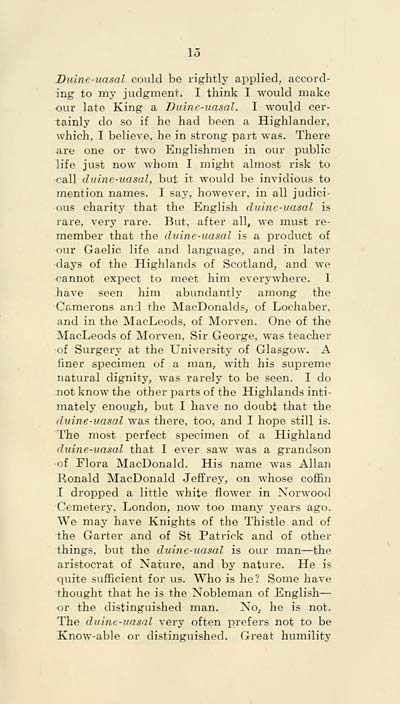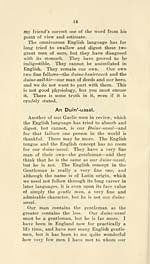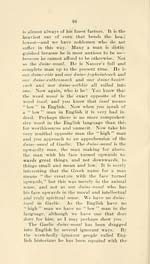Download files
Complete book:
Individual page:
Thumbnail gallery: Grid view | List view

15
JDuine-uasal could be rightly applied, accord-
ing to my judgment. I think I would make
our late King a Duinc-uasal. I would cer-
tainly do so if he had been a Highlander,
which, I believe, he in strong part was. There
are one or two Englishmen in our public
life just now whom I might almost risk to
call duine-uasal, but it would be invidious to
mention names. I say, however, in all judici-
ous charity that the English duine-uasal is
rare, very rare. But, after all, we must re-
member that the duine-uasal is a product of
our Gaelic life and language, and in later
days of the Highlands of Scotland, and we
cannot expect to meet him everywhere. I
have seen him abundantly among the
Camerons and the MacDonalds, of Lochaber,
and in the MacLeods, of Morven. One of the
MacLeods of Morven. Sir George, was teacher
of Surgery at the University of Glasgow. A
finer specimen of a man, with his supreme
natural dignity, was rarely to be seen. I do
not know the other parts of the Highlands inti-
mately enough, but I have no doubt that the
duine-uasal was there, too, and I hope still is.
The most perfect specimen of a Highland
duine-uasal that I ever saw was a grandson
of Flora MacDonald. His name was Allan
Ronald MacDonald Jeffrey, on whose coffin
I dropped a little white flower in Norwood
Cemetery. London, now too many years ago.
We may have Knights of the Thistle and of
the Garter and of St Patrick and of other
things, but the duinc-uasal is our man — the
aristocrat of Nature, and by nature. He is
quite sufficient for us. Who is he? Some have
thought that he is the Nobleman of English —
or the distinguished man. No, he is not.
The duine-uasal very often prefers not to be
Know-able or distinguished. Gi'eat humility
JDuine-uasal could be rightly applied, accord-
ing to my judgment. I think I would make
our late King a Duinc-uasal. I would cer-
tainly do so if he had been a Highlander,
which, I believe, he in strong part was. There
are one or two Englishmen in our public
life just now whom I might almost risk to
call duine-uasal, but it would be invidious to
mention names. I say, however, in all judici-
ous charity that the English duine-uasal is
rare, very rare. But, after all, we must re-
member that the duine-uasal is a product of
our Gaelic life and language, and in later
days of the Highlands of Scotland, and we
cannot expect to meet him everywhere. I
have seen him abundantly among the
Camerons and the MacDonalds, of Lochaber,
and in the MacLeods, of Morven. One of the
MacLeods of Morven. Sir George, was teacher
of Surgery at the University of Glasgow. A
finer specimen of a man, with his supreme
natural dignity, was rarely to be seen. I do
not know the other parts of the Highlands inti-
mately enough, but I have no doubt that the
duine-uasal was there, too, and I hope still is.
The most perfect specimen of a Highland
duine-uasal that I ever saw was a grandson
of Flora MacDonald. His name was Allan
Ronald MacDonald Jeffrey, on whose coffin
I dropped a little white flower in Norwood
Cemetery. London, now too many years ago.
We may have Knights of the Thistle and of
the Garter and of St Patrick and of other
things, but the duinc-uasal is our man — the
aristocrat of Nature, and by nature. He is
quite sufficient for us. Who is he? Some have
thought that he is the Nobleman of English —
or the distinguished man. No, he is not.
The duine-uasal very often prefers not to be
Know-able or distinguished. Gi'eat humility
Set display mode to: Large image | Transcription
Images and transcriptions on this page, including medium image downloads, may be used under the Creative Commons Attribution 4.0 International Licence unless otherwise stated. ![]()
| Early Gaelic Book Collections > Ossian Collection > Gaelic concepts of life and death > (23) |
|---|
| Permanent URL | https://digital.nls.uk/79283844 |
|---|
| Description | Selected books from the Ossian Collection of 327 volumes, originally assembled by J. Norman Methven of Perth. Different editions and translations of James MacPherson's epic poem 'Ossian', some with a map of the 'Kingdom of Connor'. Also secondary material relating to Ossianic poetry and the Ossian controversy. |
|---|
| Description | Selected items from five 'Special and Named Printed Collections'. Includes books in Gaelic and other Celtic languages, works about the Gaels, their languages, literature, culture and history. |
|---|

